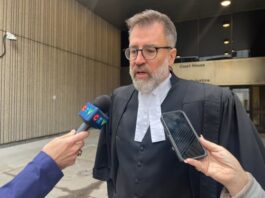
The federal government has admitted that it forced Canadians to use the ArriveCAN application even though it knew there were problems picking what language you wanted to use — French or English — on iPhones, Radio-Canada has learned.
In a report obtained by Radio-Canada that has yet to be made public, the Office of the Commissioner of Official Languages said Ottawa undermined the language rights of Canadians.
The case is now being heard in Federal Court, where the government will have to explain its management of the application. Launched in April 2020, ArriveCAN was used to record proof of vaccination against COVID-19 for all travellers wishing to enter or return to Canada.
The complainant in this case, Darius Bossé, claimed Ottawa should not have mandated the use of the application knowing the problems associated with the display language. He wanted to return to Canada from the United States in the summer of 2021 and used an English version of the application that did not allow him to switch to French.
“When I am required to make personal statements about my health and location, it is absolutely essential to me that communication with the Canadian government takes place in the official language of my choice,” Bossé said.
Unilingual application
The application’s language issues began as early as its launch in 2020, according to documents filed by Ottawa in Federal Court.
At that time, the iPhone version allowed travellers to choose a display language, but that feature was “defective” because it did not consistently respect the user’s chosen language, according to a federal government affidavit.
In addition, language preference was not always taken into account by screen readers, which are essential for users with special needs.
The government admitted to the court that it decided to “remove the language feature” in December 2020.
Users were then forced to use a version of the app based on their cell phone’s operating language, with no clear guidelines for changing it as needed.
It wasn’t until August 2021 — after Bossé’s complaint — that the government offered more precise explanations to users who wanted to communicate with Ottawa in the official language of their choice.
And it wasn’t until November 2021 that the government released an application for iPhones that allowed users to switch languages after downloading, according to the Office of the Commissioner of Official Languages.
The federal government filed the English version of its affidavits with the Federal Court on Sept. 26. The French versions were filed on Dec. 1.

Frustrated user
While travelling in the United States in 2021, Bossé tried to obtain the French version of the ArriveCAN application without success.
Having access only to the English version of the application on his cell phone, he tried to indicate on his user profile that French was his preferred language for communicating with the federal government.
Despite this, he had to continue using the English version of the application during his 14-day mandatory quarantine period. According to him, the choice of language for the operation of a cellphone is “personal” and should not affect his language rights.
After filing a complaint, Bossé won his case before the Office of the Commissioner of Official Languages in the spring of 2022.
In its report, the Office of the Commissioner of Official Languages noted that the Public Health Agency of Canada “was aware” of the difficulties in operating the application in the user’s language of choice on iPhones.
The report adds that the agency “did not inform the public […] either of this fact or how to proceed to access the app in their preferred official language.”
In June 2022, Bossé turned to Federal Court to try to prove that the agency had violated his language rights under the Canadian Charter of Rights and Freedoms and the Official Languages Act. He is seeking damages of $22,500.
“The Constitution states that people have the right to be served by the federal government in the official language of their choice. For me, it is important that the Federal Court formally recognize this,” he explains.
In an affidavit filed in Federal Court last September, the head of the ArriveCAN app, Chulaka Ailapperuma, confirmed that he faced numerous technical challenges related to the display language on Apple platforms in 2020 and 2021.
Possible solution
An expert hired by Bossé responded in a separate affidavit that the government should have been able to allow ArriveCAN users to change the language of the display within the application itself.
Gregory Cerallo, founder of Sidekick Interactive Inc. points to examples of bilingual applications created by Environment Canada, the SAQ or Hydro-Québec, all of which offer this feature.
“In my experience, inserting or maintaining a custom language feature in a mobile application poses an additional, but not insurmountable, challenge,” Cerallo says.
He calculates that developing this feature would have cost an extra $72,000.
In all, Cerallo estimates that developing an application like ArriveCAN should not have cost more than $2 million.
Instead, the federal government spent tens of millions in connection with the creation and implementation of the application.












